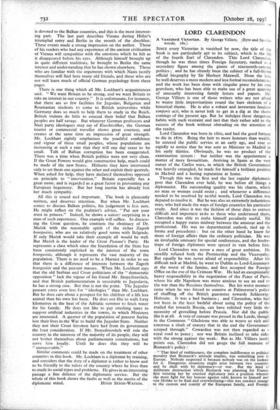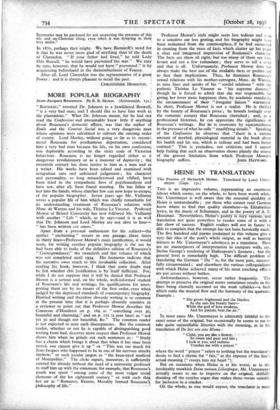LORD CLARENDON
SINCE every .Victorian is vanished by now, the title of this book is not particularly apt to its subject, which is the life of the fourth Earl' of Clarendon. This Lord Clarendon, though he was three times Foreign Secretary, ranked as a secondary figure among the giants of nineteenth-century politics ; and he has already been the. subject of a full-blown official biography -by Sir Herbert Maxwell. None the less, he well deserves a more modern and less forinal reconsideration ; and the work has been done with singular grace by his own grandson, who has been able to make use of a great quantity of unusually interesting family letters and papers. Mr. George Villiers is one of those writers who are not afraid to weave little_ improvisations round the, bare skeleton of a historical -theme. - He is alio a robust and inveterate' laUdator temporis acti, who is never loth to get in a dig at the short- comings of the 'present_ age. But he indulges these dangerous habits with such restraint and tact that they rather add to the success of the book without obtruding on the attention of the reader.
Lord Clarendon was born in 1800, and had the good fortune to die in 1870. Being the heir to more honours than wealth, he entered the public service at an early age, and rose so rapidly to notice that he was sent as Minister to Madrid in his early thirties. Obviously, he was no product of the examination system : but neither was the appointment a matter of mere favouritism. Arriving in Spain at the very outset of the Carlist wars, in which the British Government was heavily entangled, he made for himself a brilliant position in Madrid and 'a -lasting "reputation at-home.
Though this was the first and the last regular diplomatic post that Clarendon ever held, he was before all things a diplomatist. His outstanding quality was his charm, which no man or woman could resist ; and whenever a difference needed to be resolved by tactful words, Lord Clarendon was
deputed to resolve it. But he was also an extremely industrious man, who had made the ways of foreign countries his particular study. And since it was the fashion of those days to entrust difficult and important tasks to those who understood them, Clarendon was able to make himself peculiarly useful. Fie occupied a happy status midway between the amateur and the professional. His was no departmental. outlook, :tied up in forms and precedenti : but on the other hand he knew far More of. foreign affairs than the ordinary politician. He was an invaluable emissary for special conferences, and the booby- traps of foreign diplomats were spread in vain before him.
Lord Clarendon was never a man of *great ambition. He steadily refused both the Premiership and the Viceroyalty. But equally he was never afraid of responsibility. After his difficult task at Madrid, he went to Dublin as Lord-Lieutenant
at the worst of the famine, and first accepted the Foreign Office on the eve of the Crimean War. He had an exceptionally heavy responsibility in the negotiation of the Peace of Paris, where his ally Napoleon was more anxious to see an end to the war than the Russians themselves. But his worst moment came when he was forced to connive at Palmerston's poliCy of shuffling off the British guarantee towards Schleswig- Holstein. It was a bad business ; and Clarendon, who hid not been , in the least bashful about using the policy of the
mailed fist towards Russia, can have relished very little the necessity of grovelling before Prussia. Nor did the public like it at all. A vote of censure was passed in the Lords, though in the Commons " Gladstone was able to weave so rich and sonorous a cloak of oratory that in the end the Government scraped through." Cowardice was not then regarded as a royal road to peace ; nor was Britain inclined to take sides with the strong against the weak.' But as Mr: Villiers justly points out, Clarendon did not gauge the full measure of
Bismarck's policy - _ •
" That kind of ruthlessness, the complete indifference to political morality that Bismarck's attitude implies, was something new in Europe. Nobody suspected it because nobody was on the lookout for it. Dangerous situations might arise between two countries and be dealt with by diplomacy—or war. But the kind of deliberate destruction which Bismarck was planning_ for France. first 'twisting her by crooked diplomicy into. a .position wherein ske must fight for her honour against odds known to himself and von Moltke to be final and overwhelming—this was conduct strange to the custom and comitY' of the -Entwean family, and Foreign secretaries may be pardoned for not suspecting the presence of this vile and un-Christian thing, even when it was festering in their very midst."
In 1870, perhaps they-might. - We haVe Bismarck's word for it that he was never more glad' of anything thrin-Of the -death of Clarendon. " If your father had lived," he told Lady Odo Russell, " he would have prevented 'the war." . We may be sure, however, that he would not have ," prevented " it by acquiescing beforehand in the diiinemberMent of Prance_.
After all, Lord Clarendon was the representative of-a great Power : and it is always pleasant to recall the- past.
_ CHtusxor s HointousE.

























































 Previous page
Previous page